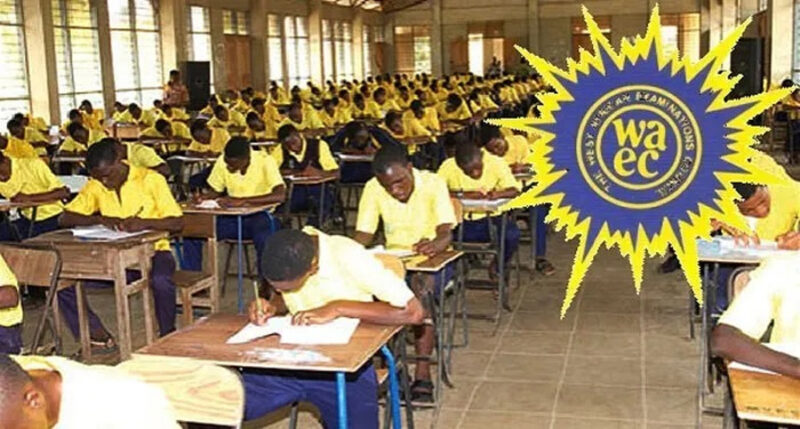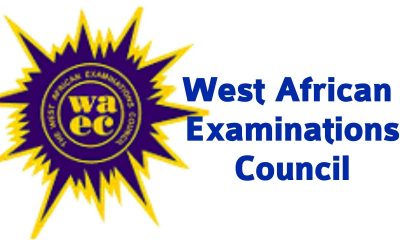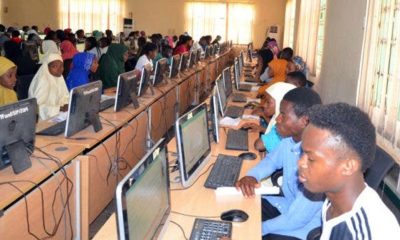Education
2023 WASSCE begins Monday, WAEC assures candidates’ safety

2023 WASSCE begins Monday, WAEC assures candidates’ safety
The West African Examinations Council says adequate measures are in place for the safety of all candidates that registered for its 2023 West African Senior School Certificate Examination (WASSCE) for school candidates.
The council’s Head. National Office (HBO) Patrick Areghan gave the assurance during an interactive session with newsmen on the level of preparations ahead the examination nationwide, on Thursday in Lagos.
Areghan stated that the examination had been scheduled for Monday May 8 to Friday, June 23, spanning a period of seven weeks.
The WAEC boss said that the council could not feign ignorance of the level of insecurity in the country, hence conducting examinations under such situation had been a daunting task.
According to him, there are many flashpoints all over the country, and conducting examinations in such areas, requires extra security arrangement.
“Consequently, we are liaising with the Inspector General of Police, Brigade Commanders, other security agencies and the various state governments to provide security.
“This is in order to ensure that the examination is conducted under a secure and safe environment. We have also sought the intervention of the Minister of Education in this respect.
READ ALSO:
- Tinubu and the meaning of insanity
- Police release suspended Adamawa REC on bail
- Organ harvesting: Ekweremadus know fate today
“Similarly, our zonal and branch offices have reached out to various security outfits in their respective locations for assistance. Courtesy visits and other forms of appeals have been made and we have been assured of full cooperation of the security agencies to this effect.
“If and when the need arises, schools in insecurity-prone areas would be relocated to safe havens, with the full approval, cooperation and participation of the Federal or State Government concerned,” he said.
Speaking further, Areghan noted that a total of 1,621,853 candidates from 20,851 secondary schools across the country had registered for the examination.
He noted that of this number, 798,810 are male, representing 49.25 per cent, while 823,043 are female, representing 50.75 per cent.
The HNO noted that on the whole, the candidature for the 2023 WASSCE (School Candidate) increased by 13, 868 over the figure of 2022, which was 1,607,985, for the same diet.
He said that for the second time in succession, the council had successfully reverted to the May/June period for the conduct of the examination, describing it as remarkable.
According to him, the significance of this landmark is that WAEC and the various member states, with the exception of Ghana, have again found a common ground in respect of their academic calendars.
“This shows a massive recovery from the devastating effects of the COVID-19 pandemic. Our sincere gratitude goes to the minister of Education and his ministry for this memorable achievement and to the registrar to council, for his untiring efforts,” he said.
He noted that the council had established a “Self-Service” system for candidates, through the CHATBOT Platform.
Areghan stated that this was to enable them to access their entries, which in most cases the schools do not allow them to see, contrary to instructions.
According to him, the candidate Self-Service is a service on the Request Management System/Chatbot (https://request.waec.ng) that allows students to confirm data uploaded for them by schools in order to make necessary corrections (if any)on such.
He said that it provided two key services on the Request Management System — Confirmation of Entry/Registration and Confirmation of Continuous Assessment Score (CASS), among others.
READ ALSO:
- How Buhari policies, progs have met many at their point of need, by Femi Adesina
- Osimhen shines as Napoli clinch first Serie A title in 33 years
- LP suspends Kenneth Okonkwo, 11 others for anti-party activities
On the issue of the use of National Identification Number (NIN) as requisite for registration for the examination, the WAEC boss noted that though not compulsory, the NIN was made a component of the registration requirements.
“The policy came into being in line with the directive of the Federal Government. Candidates were expected to supply their NIN at the registration stage, but it was not a compulsory requirement.
“This is in order to avoid denying many eligible candidates access to the portal/examination. Even after the registration exercise, candidates were still allowed to submit their NIN for upload.
” Therefore, no candidate was disqualified from registration as a result of non-submission of NIN at the beginning of the exercise, or even later,” he explained.
Areghan, however, frowned at deliberate efforts by some private school owners not to adhere to registration deadline.
According to him, the ugly development has been a huge challenge to the entire examination procedure.
“There was a very serious challenge of non-adherence to the registration deadline, to the extent that what we started on Oct. 10, 2022, with a set deadline of January 27 and eventually extended to March 31.
“It could not even end due to the shenanigans of some private schools who were in the habit of shopping for external candidates to make up numbers, contrary to the policy which does not allow the enrolment of private candidates for School Candidates examination.
“Entries eventually closed on April 15. The examination starts on Monday, May 8.
“But it will surprise you to know that some schools are still bombarding us with requests for entries, even after the pre-examination, examination and post examination materials have been produced and are being distributed to the various states of the federation,” he said.
On the issue of examination malpractice, he warned that the council would deal decisively with any kind, irrespective of who was involved.
According to him, penalties for involvement in examination malpractice will always, without compromise, be meted out to those found involved.
READ ALSO:
- Army rescues two more Chibok schoolgirls with kids
- Passengers stranded at Owerri airport as NLC enforces no-flight order
- Troops rescue two abducted aid workers in Borno
He said that such candidates, invigilators, supervisors, schools, and WAEC officials, among others, as would be penalised as approved by the Nigeria Examinations Committee (NEC).
Areghan said that the NEC was the highest decision-making organ of the council that deliberated on examination matters in Nigeria.
He said that council, on its part, had rolled out several awareness campaigns and organised seminars for school proprietors.
Areghan noted that principals, students, teachers and other key stakeholders in branch and zonal offices nationwide had also been exposed to such awareness campaigs, in order to sensitse them of the ills of the ugly trend.
“Similarly, we have made flyers, banners, posters and other forms of reminders to further keep the message afresh on the minds of all stakeholders.
“It is, therefore, on this note that I call on parents and guardians to encourage their wards to study diligently and desist from engaging in any form of examination malpractice.
“The media must play its watch-dog role too. The various ministries of education should call their principals, teachers and other officials serving as inspectors and/or supervisors, to order.
“Supervisors should desist from allowing candidates to make use of their cell phones, or availing the candidates of their own (supervisors’) cell phones
“Any form of aiding and abetting or collusion, should be avoided. Every candidate and examination functionary must play by the rules, which are well stipulated in the WAEC Syllabus and Guidelines for the conduct of examinations, issued to schools.
“Erring schools will be derecognised, erring officials adequately punished, while erring candidates would lose their results,” he warned.
He stated that in line with council’s usual practice, the results of candidates sitting the examination would be released 45 days after the conduct of the last paper.
According to him, the certificates will be printed and issued to schools in less than 90 days after the release of results.
He added that WAEC in Nigeria, in its bid to serve the Nigerian child better, had acquired a state-of-the-art digital certificate printer, that enabled it to print and issue certificates to candidates in record time.
2023 WASSCE begins Monday, WAEC assures candidates’ safety
Education
FG Clarifies WAEC Subject Selection, Says Students Free to Choose Across All Fields

FG Clarifies WAEC Subject Selection, Says Students Free to Choose Across All Fields
The Federal Government has issued a clear explanation on subject selection under the revised Senior Secondary School Curriculum as registration for the West African Examinations Council (WAEC) continues nationwide.
In a joint statement released on Saturday, the Minister of Education, Maruf Tunji Alausa, and the Minister of State for Education, Sa’id Suwaiba Ahmad, clarified that there is no restriction or exclusion attached to the choice of any approved subject.
“All subjects remain fully open for students to choose from, provided such choices are properly guided by the school authority, parents, or a certified school counsellor,” the ministers stated.
They explained that science students are free to pick subjects traditionally grouped under the arts or social sciences, while arts and social science students may also select science-based subjects. According to the ministers, the revised curriculum was designed to be flexible, student-centred, and supportive of diverse academic interests and career pathways.
READ ALSO:
- Court Orders Wike to Respond to Tonye Cole’s ₦40bn Defamation Suit
- CAC to Begin Nationwide Crackdown on Unregistered PoS Operators by January 2026
- Studies show menopause can reduce women’s memory, concentration by 40%
The government also clarified that the subject previously known as Information and Communication Technology (ICT) has now been renamed Digital Technology, stressing that the adjustment is only a change in nomenclature. The curriculum content remains intact, and students who offered ICT are fully qualified to register for Digital Technology in both internal and external examinations.
Addressing concerns over trade subjects, the Ministry noted that six have been officially approved.
“A student may register for any of these subjects if the school offers them and the student has been taught the subject. However, there is no obligation to register for a trade subject where a student has not been exposed to any of the six approved options,” the statement added.
Reaffirming its commitment to smooth and accurate examination processes, the Ministry urged parents, school owners, counsellors and examination bodies to rely on verified information and ensure proper guidance to all candidates.
The Federal Government assured that it will continue to promote seamless, well-coordinated WAEC registration across the country.
FG Clarifies WAEC Subject Selection, Says Students Free to Choose Across All Fields
Education
NECO grants full accreditation to schools in Burkina Faso to conduct SSCE, BECE exams

NECO grants full accreditation to schools in Burkina Faso to conduct SSCE, BECE exams
The National Examinations Council (NECO) has expanded its international operations with the accreditation of schools in Burkina Faso to conduct its flagship examinations, the Senior School Certificate Examination (SSCE) and the Basic Education Certificate Examination (BECE).
In a statement released in Abuja on Sunday, the council’s Acting Director of Information and Public Relations, Mr. Azeez Sani, confirmed that NECO granted full approval after a comprehensive assessment of selected institutions in the West African nation.
According to Sani, a NECO accreditation team evaluated the schools’ infrastructure and readiness by inspecting classrooms, laboratories, libraries, computer labs, workshops, examination halls, sports facilities and overall security architecture. The team also reviewed Continuous Assessment (CA) records, staffing levels, and the general learning environment before issuing approval.
“Following a thorough and detailed evaluation, the schools were granted full accreditation to host the SSCE and BECE,” Sani said.
READ ALSO:
- Four Dead, Ten Injured in Mass Shooting at Child’s Birthday Party in California
- White House Shooting: Suspect Once Worked With CIA as US Opens Full Terrorism Probe
- Nigerian army rescues 12 teenage girls abducted by Boko Haram in Borno state
He added that NECO’s expansion into Burkina Faso reflects its growing commitment to providing quality education assessment services across Africa. With this development, the council strengthens its goal of becoming a leading continental examination body serving both Nigerian and foreign students.
Sani further recalled that NECO recently established an examination centre in London, United Kingdom, adding to existing centres in Togo, Benin Republic, Niger Republic, Equatorial Guinea, Côte d’Ivoire, and Saudi Arabia.
Nigeria’s Ambassador to Burkina Faso, Amb. M.D. Galadima, applauded the development, describing it as a major relief for Nigerian families in the country. He noted that parents previously had to take their children to Saki, Oyo State, to register and sit for NECO exams — a process that posed security risks and imposed heavy financial burdens.
“With this accreditation, those risks are eliminated, and families can now save significant costs,” Galadima said, urging Nigerians in Burkina Faso to seize the opportunity by enrolling their children for NECO examinations.
Leader of the accreditation team, Dr. Uche Ezenwanne, said the approval now allows Nigerian students residing in Burkina Faso to write the SSCE and BECE without travelling back home.
NECO grants full accreditation to schools in Burkina Faso to conduct SSCE, BECE exams
Education
Study Permit Reform: Canada Exempts Postgraduate Students From PAL/TAL in 2026

Study Permit Reform: Canada Exempts Postgraduate Students From PAL/TAL in 2026
The Government of Canada has unveiled major reforms to its study permit system, announcing a more streamlined process for international postgraduate students beginning January 2026. Under the new policy, master’s and doctoral candidates enrolled in public Designated Learning Institutions (DLIs) will no longer be required to submit Provincial or Territorial Attestation Letters (PAL/TAL).
The policy shift forms part of a broader federal plan to simplify pathways for highly skilled students while maintaining firm control over overall international student intake.
The PAL/TAL system, introduced to help provinces regulate student numbers, has improved oversight but also increased processing times and administrative workload. The 2026 exemption is expected to significantly speed up permit approvals for postgraduate applicants and reduce paperwork.
Despite easing requirements for advanced degree programs, Canada will continue enforcing a national cap on international students. Under the 2026–2028 Immigration Levels Plan, Ottawa intends to issue up to 408,000 study permits in 2026—comprising 155,000 new permits and 253,000 extensions. This marks a 7% drop from 2025 and 16% below 2024 levels. However, the government says it remains committed to attracting top-tier researchers and graduate talent.
READ ALSO:
- Kano Insecurity: Barau Challenges Govt to Produce Evidence of Alleged Incitement
- Ganduje fires back as Kano Govt demands his arrest over alleged incitement, militia support
- Troops repel major Boko Haram/ISWAP attack in Chibok, kill scores in NAF airstrikes
Under the revised rules, PAL/TAL exemptions will apply to:
- Master’s and PhD students at public DLIs
- K–12 learners
- Certain federal priority and vulnerable groups
- Current study permit holders applying for extensions at the same level and institution
Of the 309,670 study permit spaces allocated under the 2026 cap, an estimated 180,000 applicants will still require PAL/TALs, allowing provinces to retain oversight on enrolment levels.
Master’s and PhD candidates will also be removed from the national study permit cap, ensuring they are not subject to annual limits. Additionally, PhD applicants will benefit from expedited 14-day processing, part of Canada’s strategy to remain globally competitive in research recruitment.
Federal targets for new international student entries remain:
- 2026: 155,000 (range: 150,000–160,000)
- 2027: 150,000 (range: 145,000–155,000)
- 2028: 150,000 (range: 145,000–155,000)
These targets apply to students entering academic programs longer than six months at approved DLIs.
The reforms highlight Canada’s dual-track approach: maintaining tighter control over total enrolment while incentivising high-level research, innovation, and postgraduate education. By removing administrative barriers and offering faster processing for top applicants, Canada aims to strengthen its position as a leading destination for skilled and ambitious international students.
Study Permit Reform: Canada Exempts Postgraduate Students From PAL/TAL in 2026
-

 metro3 days ago
metro3 days agoSenate Launches Emergency Probe into Widespread Lead Poisoning in Ogijo, Lagos/Ogun
-

 News3 days ago
News3 days agoBREAKING: Tinubu Sends Fresh Ambassadorial Nominations to Senate, Names Ibas, Ita Enang, Dambazau
-

 Auto3 days ago
Auto3 days agoCourt of Appeal Affirms Ruling Barring VIO from Seizing Vehicles or Fining Motorists
-

 Sports1 day ago
Sports1 day ago2026 FIFA World Cup Draw: England Draw Croatia as Brazil Face Morocco in Tournament Opener
-

 News3 days ago
News3 days agoUS authorities arrest Nigerian CEO Cashmir Chinedu Luke for alleged $7m VA fraud
-

 metro3 days ago
metro3 days agoFG secures release of three Nigerians detained in Saudi Arabia
-

 metro3 days ago
metro3 days agoNed Nwoko vows legal action against rising online harassment, criminal defamation
-

 metro3 days ago
metro3 days agoBuratai Defends Nigeria’s Resilience, Says Nation Is “Rising, Not Failing” Despite Insecurity













